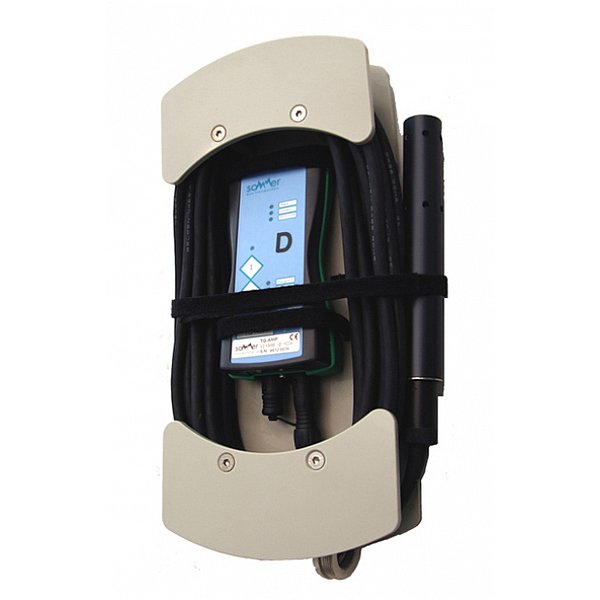Tracer System TQ-F
Mobile discharge measurement system for turbulent rivers with unknow cross-section profile - fluorescence Tracer The discharge measurement is performed by using the well-established tracer-dilution method and is especially suitable for high volumes of water. The… Read more
GENERAL |
|
| Mesasuring principle | tracer dilution method with instantaneous feed |
| Application | all discharge volumes |
TQ-AMP (MEASUREMENT DEVICE WITH BLUETOOTH-TRANSMISSION) |
|
| Memory capacity | none (data storage in the receiving device) |
| Tranmsission interval | 1 second |
| Data transfer | Bluetooth class 1 (transmission range up to 100m) |
| Operating temperature | -20 ... +60 °C |
| Protection | IP66 |
| Energy supply | 3x 1.5 V batteries, size AA or 3x 1.5 V / 2500 mAh NiMH batteries, size AA |
| Operation time | 25 hrs (with 3x 2500 mAh batteries) |
| Charging time | approx. 10 hrs |
PROBES |
|
| Probe type | fluorescence probe |
| Measurement range | Fluorescein/Rhodamine: 0 ... 50 μg/l (ppb) |
| Resolution | 0.05 μg/l (ppb) |
| Operating temperature | 0 ... +50 °C (Further types of probes for different tracer substances available upon request.) |
ACCESSORIES INCLUDED |
|
| Pipette | 500 μl pipette |
| Jars | bottle for calibration solution, measuring cup stainless steel 750 ml, measuring cup 500 ml, volumetric flask 500 ml |
| Others | USB memory stick (software and documentation), USB Bluetooth adapter, recharger, protection- and weighting armour |
| TQ-Commander (software) | PC-Version Windows XP, Windows Vista or Windows 7 up to 10 |
Mobile discharge measurement system for turbulent rivers with unknow cross-section profile - fluorescence Tracer
The discharge measurement is performed by using the well-established tracer-dilution method and is especially suitable for high volumes of water. The system can be deployed in turbulent rivers, creeks or waters for which data regarding the cross-section profile are not available or unknown. It is used a fluorescent material as tracer. After insertion of a known amount of tracer material two optical fluorescence probes automatically determine the discharge. This way high plausibility and accurate results can be achieved. New TQ-COMMANDER V2 software is available!
Implementation
The tracer dilution method can be applied for discharge measurement in all waters in which a thorough mixing of the tracer takes place. High turbulences, alternating cross sections and stones promote the mixing process and therefore are helpful. For particularly turbulent waters and very high flow velocities there is a TQ-version available where the sensitive probes are protected with a robust reinforcement. The user-friendly software TQ-Commander leads comfortably through the measurement and provides a full measuring report after the measurement.
- Simple, mobile discharge measurement
- Reliable results even without knowledge and independent of the cross-section profile
- Suitable for fast-flowing, turbulent waters or where access is limited
- Applied especially with water amounts of several m³/s
- Environmentally friendly, harmless for water
- Discharge values immediately available
- Easy transmission of measurement data form the sensor to receiving device via Bluetooth
- Convenient receiving of data on laptop
- Real-time visualisation of measurement data
- User-friendly guidance through the measurement by the included software TQ-Commander
- Simultaneous measurement with up to four probes
- Tracer material: fluorescence (fluorescein or similar)
- Probe type: optical fluorescence probe
- Compact and convenient: complete equipment securely packed in two cases
The TQ-Tracer system is especially suitable for fast-flowing, turbulent waters with complex cross sections, for example mountain streams, small brooks, tributaries or even fish passes. Equally the TQ-tracer works very well in shallow rivers where most other instruments fail to get reliable results or cannot be used any more at all.
The TQ is used particularly in hydrometry as well as by consulting engineers, civil engineers, and hydropower plant operators monitoring the discharge, for control measurements or for project evaluations.
-
Brochure TQ-Tracer
-
Commander Licence and Registration The
-
Quick start license manual
-
User Manual








